英语大作业-综述
- 格式:pdf
- 大小:77.39 KB
- 文档页数:3
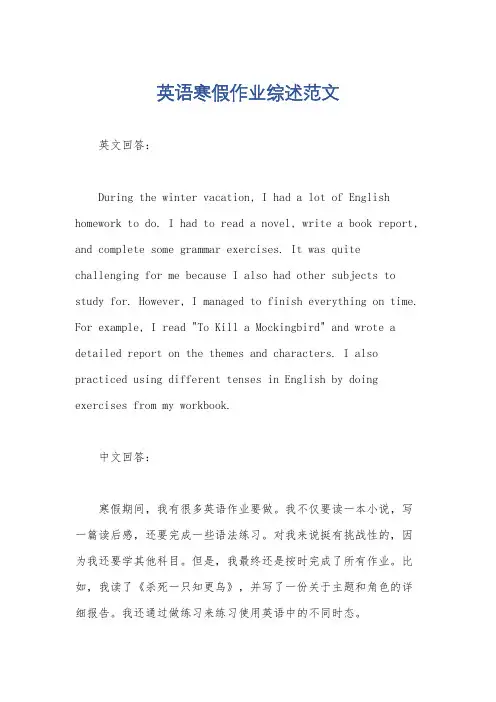
英语寒假作业综述范文
英文回答:
During the winter vacation, I had a lot of English homework to do. I had to read a novel, write a book report, and complete some grammar exercises. It was quite challenging for me because I also had other subjects to study for. However, I managed to finish everything on time. For example, I read "To Kill a Mockingbird" and wrote a detailed report on the themes and characters. I also practiced using different tenses in English by doing exercises from my workbook.
中文回答:
寒假期间,我有很多英语作业要做。
我不仅要读一本小说,写一篇读后感,还要完成一些语法练习。
对我来说挺有挑战性的,因为我还要学其他科目。
但是,我最终还是按时完成了所有作业。
比如,我读了《杀死一只知更鸟》,并写了一份关于主题和角色的详细报告。
我还通过做练习来练习使用英语中的不同时态。
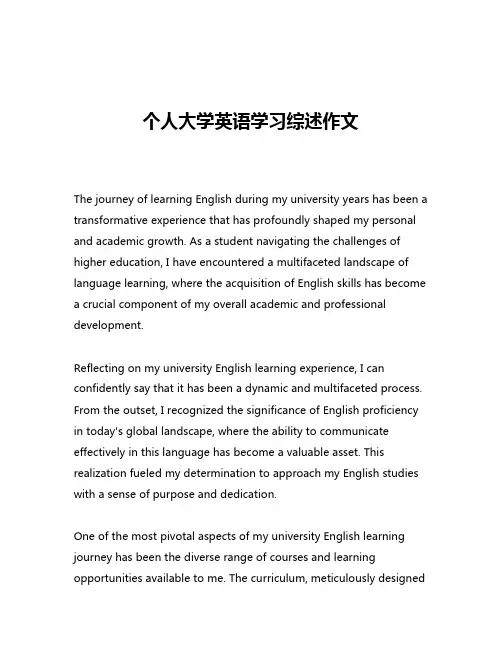
个人大学英语学习综述作文The journey of learning English during my university years has been a transformative experience that has profoundly shaped my personal and academic growth. As a student navigating the challenges of higher education, I have encountered a multifaceted landscape of language learning, where the acquisition of English skills has become a crucial component of my overall academic and professional development.Reflecting on my university English learning experience, I can confidently say that it has been a dynamic and multifaceted process. From the outset, I recognized the significance of English proficiency in today's global landscape, where the ability to communicate effectively in this language has become a valuable asset. This realization fueled my determination to approach my English studies with a sense of purpose and dedication.One of the most pivotal aspects of my university English learning journey has been the diverse range of courses and learning opportunities available to me. The curriculum, meticulously designedby the institution, has provided me with a well-rounded foundation in various aspects of the English language. From comprehensive grammar and vocabulary modules to specialized courses in academic writing, oral communication, and literature, I have had the privilege of delving into the intricacies of the language, honing my skills, and expanding my knowledge.The classroom environment has played a crucial role in shaping my English learning experience. The interactive and collaborative nature of the classes has allowed me to engage in thought-provoking discussions, participate in group projects, and receive valuable feedback from both my professors and peers. This dynamic setting has not only enhanced my understanding of the language but has also fostered the development of critical thinking, problem-solving, and interpersonal skills – all of which are essential for success in both academic and professional spheres.Beyond the confines of the classroom, I have actively sought out opportunities to immerse myself in the English-speaking world. Participating in language exchange programs, attending extracurricular workshops and seminars, and engaging in social activities with fellow English learners have all contributed to my language acquisition and cultural awareness. These experiences have allowed me to apply my classroom knowledge in real-world settings, further solidifying my grasp of the language and its nuances.One of the most significant challenges I have faced during my university English learning journey has been the constant need to adapt and evolve. As my proficiency in the language has grown, so too have the expectations and demands placed upon me. Navigating the transition from basic communication to more sophisticated academic and professional-level English has required a high degree of discipline, resilience, and a willingness to step out of my comfort zone.However, it is precisely these challenges that have fueled my personal growth and development. Through the process of overcoming linguistic barriers, I have cultivated a deeper appreciation for the complexities of the English language and the importance of continuous learning. Each obstacle I have faced has served as an opportunity to refine my skills, expand my knowledge, and develop a more nuanced understanding of the language.Furthermore, the university's support systems, such as language labs, tutoring services, and writing centers, have been instrumental in my success. These resources have provided me with the necessary tools and guidance to tackle the various aspects of English learning, from improving my grammar and vocabulary to honing my academic writing and presentation skills.As I reflect on my university English learning experience, I am filled with a sense of pride and accomplishment. The knowledge and skills I have acquired have not only enhanced my academic performance but have also opened up a world of opportunities for me. I am now equipped with the linguistic proficiency to engage in cross-cultural communication, pursue international internships and study abroad programs, and confidently navigate the global job market.Looking ahead, I am excited to continue my English learning journey, leveraging the foundation I have built during my university years. I recognize that the mastery of a language is an ongoing process, and I am committed to maintaining and further developing my English skills through lifelong learning and continued engagement with the language.In conclusion, my university English learning experience has been a transformative and enriching journey. It has not only equipped me with the necessary language skills but has also fostered personal growth, cultural awareness, and a deep appreciation for the power of effective communication. As I move forward, I am confident that the knowledge and skills I have acquired will serve as a valuable asset, empowering me to navigate the ever-evolving global landscape and achieve my personal and professional aspirations.。
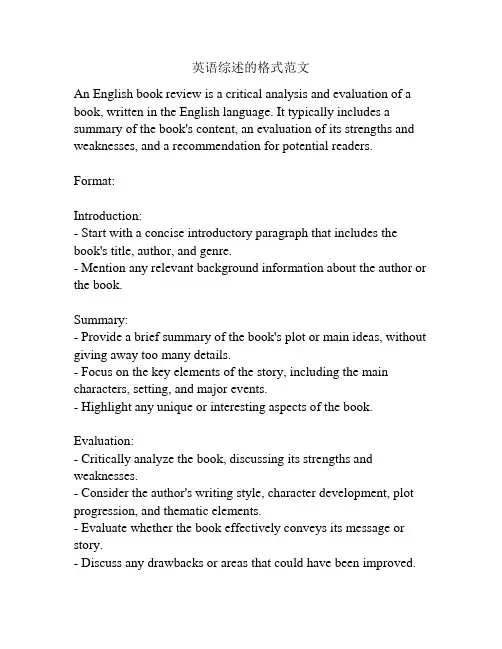
英语综述的格式范文An English book review is a critical analysis and evaluation of a book, written in the English language. It typically includes a summary of the book's content, an evaluation of its strengths and weaknesses, and a recommendation for potential readers.Format:Introduction:- Start with a concise introductory paragraph that includes the book's title, author, and genre.- Mention any relevant background information about the author or the book.Summary:- Provide a brief summary of the book's plot or main ideas, without giving away too many details.- Focus on the key elements of the story, including the main characters, setting, and major events.- Highlight any unique or interesting aspects of the book.Evaluation:- Critically analyze the book, discussing its strengths and weaknesses.- Consider the author's writing style, character development, plot progression, and thematic elements.- Evaluate whether the book effectively conveys its message or story.- Discuss any drawbacks or areas that could have been improved.Key Points:- Select a few crucial points or themes from the book to discuss in-depth.- Support your analysis with evidence from the text, such as direct quotes or specific scenes.- Provide insights and interpretations, evaluating the book's impact and significance.Conclusion:- Summarize your overall evaluation of the book.- Recommend whether the book is worth reading and to whom it may appeal.- Conclude with a final thought or reflection on the book's lasting impression.Example:Title: "To Kill a Mockingbird"Author: Harper LeeGenre: Bildungsroman, Southern GothicIntroduction:"To Kill a Mockingbird" by Harper Lee is a classic American novel that explores themes of racial injustice and the loss of innocence. It was first published in 1960 and has since become a staple of literature.Summary:Set in the 1930s in a small fictional town in Alabama called Maycomb, "To Kill a Mockingbird" follows Scout, a young girl, asshe navigates the complexities of racial prejudice. Scout's father, Atticus Finch, is a lawyer defending a black man named Tom Robinson who has been falsely accused of rape. Through Scout's eyes, the reader witnesses the injustice and racial tensions that permeate Maycomb.Evaluation:Harper Lee's writing style is captivating, as she skillfully captures the innocence and curiosity of Scout's childhood. The character development is superb, particularly through Scout's interactions with her older brother Jem and their friendship with a boy named Dill. The depiction of racial prejudice and the moral courage exhibited by Atticus Finch are powerful, showcasing the social issues prevalent during that time.However, the pacing of the story at times feels a bit slow, and some readers may find it hard to connect with the older narrative style. Nevertheless, these minor drawbacks do not overshadow the book's overall impact.Key Points:One key element in "To Kill a Mockingbird" is the exploration of prejudice and its consequences. The book powerfully depicts the destructive nature of racism and the challenges faced by those who dare to challenge the status quo. Through the character of Atticus Finch, Lee presents a moral compass that inspires readers to question their own prejudices and prejudices of society. Conclusion:"To Kill a Mockingbird" is a must-read book that tackles importantthemes still relevant today. It serves as a reminder that society needs individuals willing to stand up for justice and equality. I highly recommend this book to anyone interested in thought-provoking literature and an exploration of societal issues. Remember that this is just one example of an English book review format. The structure may vary depending on the requirements or preferences of the assignment or publication.。
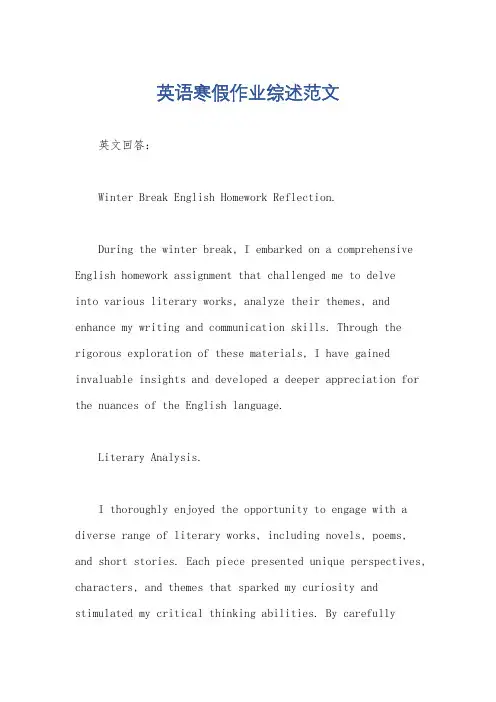
英语寒假作业综述范文英文回答:Winter Break English Homework Reflection.During the winter break, I embarked on a comprehensive English homework assignment that challenged me to delveinto various literary works, analyze their themes, and enhance my writing and communication skills. Through the rigorous exploration of these materials, I have gained invaluable insights and developed a deeper appreciation for the nuances of the English language.Literary Analysis.I thoroughly enjoyed the opportunity to engage with a diverse range of literary works, including novels, poems, and short stories. Each piece presented unique perspectives, characters, and themes that sparked my curiosity and stimulated my critical thinking abilities. By carefullyexamining the language, structure, and symbolism employed by the authors, I gained a profound understanding of the complexities and subtleties of literary expression.Essay Writing.The homework assignment required me to write several essays that demonstrated my ability to articulate clear and well-supported arguments. I chose topics that resonated with me and conducted extensive research to gather evidence and support my claims. The process of crafting persuasive essays forced me to refine my writing skills, organize my thoughts logically, and effectively convey my ideas to an audience.Communication Skills.In addition to writing essays, I also participated in several online discussions where I engaged with classmates to share insights and exchange perspectives on the literary works. These discussions not only broadened my understanding but also improved my ability to communicatemy thoughts effectively in a written and articulate manner.Furthermore, I took advantage of the opportunity to practice my verbal communication skills by presenting my findings and leading discussions during online group meetings. These experiences gave me confidence in myability to express myself clearly and persuasively, both in written and oral forms.Personal Growth.Beyond the academic benefits, this homework assignment has also fostered my personal growth. It has instilled in me a lifelong passion for reading and writing, and it has ignited my curiosity to explore the world of literature further. The challenges I faced along the way taught me the importance of perseverance and resilience, and the rewards I reaped have fueled my motivation to continue learning and improving.中文回答:寒假英语作业综述。

个人英语学习综述英语作文500字When it comes to English learning, I've had my share of ups and downs. Sometimes, I feel like I'm making progress, and other times, I struggle with the language. But that'sall part of the journey, right?One thing I've learned is that consistency is key. Ican't just study for a week and then forget about it for a month. I have to keep at it, even if it's just a little bit each day. Whether it's reading a short article, watching a video in English, or even just listening to music, it all helps.Another thing I've found useful is to immerse myself in the language. Watching movies or TV shows in English with subtitles is a great way to do that. I can pick up new vocabulary and phrases just by hearing them used in context. Plus, it's fun!I also try to make friends with native English speakers.It's a great way to practice speaking and listening. We can chat about anything and everything, and I always learn something new.Don't forget to enjoy the process, though. Learning a new language can be challenging, but it's also really rewarding. When I can understand something in English thatI couldn't before, or when I can express myself more clearly, it feels amazing. So keep going, and don't give up! You'll get there eventually.。
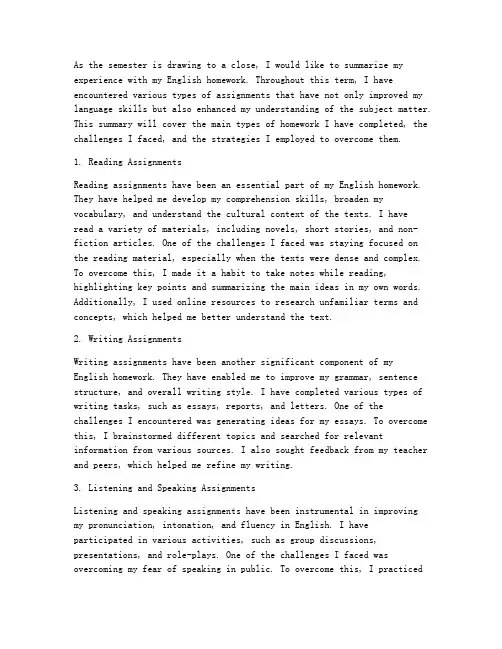
As the semester is drawing to a close, I would like to summarize my experience with my English homework. Throughout this term, I have encountered various types of assignments that have not only improved my language skills but also enhanced my understanding of the subject matter. This summary will cover the main types of homework I have completed, the challenges I faced, and the strategies I employed to overcome them.1. Reading AssignmentsReading assignments have been an essential part of my English homework. They have helped me develop my comprehension skills, broaden my vocabulary, and understand the cultural context of the texts. I haveread a variety of materials, including novels, short stories, and non-fiction articles. One of the challenges I faced was staying focused on the reading material, especially when the texts were dense and complex. To overcome this, I made it a habit to take notes while reading, highlighting key points and summarizing the main ideas in my own words. Additionally, I used online resources to research unfamiliar terms and concepts, which helped me better understand the text.2. Writing AssignmentsWriting assignments have been another significant component of myEnglish homework. They have enabled me to improve my grammar, sentence structure, and overall writing style. I have completed various types of writing tasks, such as essays, reports, and letters. One of the challenges I encountered was generating ideas for my essays. To overcome this, I brainstormed different topics and searched for relevant information from various sources. I also sought feedback from my teacher and peers, which helped me refine my writing.3. Listening and Speaking AssignmentsListening and speaking assignments have been instrumental in improving my pronunciation, intonation, and fluency in English. I haveparticipated in various activities, such as group discussions, presentations, and role-plays. One of the challenges I faced was overcoming my fear of speaking in public. To overcome this, I practicedspeaking in front of the mirror and recorded myself to identify areasfor improvement. I also joined a language exchange group to practice speaking with native speakers, which significantly boosted my confidence.4. Vocabulary ExercisesVocabulary exercises have been crucial in expanding my English vocabulary and improving my ability to express myself accurately. I have completed various types of exercises, such as matching words to their definitions, filling in the blanks, and using new words in sentences. One of the challenges I faced was remembering new words. To overcome this, I created flashcards and used them regularly. I also tried to incorporate new words into my daily conversations and writing, which helped me retain them better.5. Grammar ExercisesGrammar exercises have been essential in improving my understanding of English grammar rules and applying them correctly in my writing. I have completed various types of exercises, such as identifying parts of speech, correcting errors, and analyzing sentence structure. One of the challenges I faced was memorizing the rules. To overcome this, I created a grammar workbook and referred to it regularly. I also sought help from my teacher when I encountered difficulties.In conclusion, my English homework has been a valuable learning experience that has helped me develop my language skills and improve my understanding of the subject matter. By facing challenges head-on and employing various strategies, I have made significant progress in my English language proficiency. As I move forward, I will continue to work on my skills and strive for excellence in my language studies.。
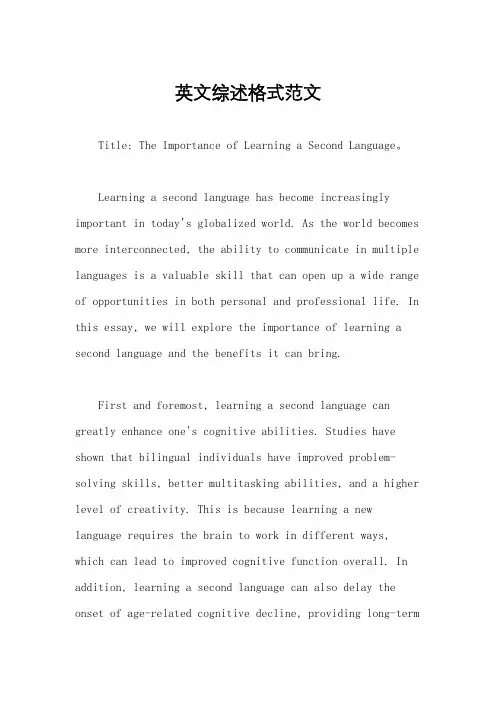
英文综述格式范文Title: The Importance of Learning a Second Language。
Learning a second language has become increasingly important in today's globalized world. As the world becomes more interconnected, the ability to communicate in multiple languages is a valuable skill that can open up a wide range of opportunities in both personal and professional life. In this essay, we will explore the importance of learning a second language and the benefits it can bring.First and foremost, learning a second language can greatly enhance one's cognitive abilities. Studies have shown that bilingual individuals have improved problem-solving skills, better multitasking abilities, and a higher level of creativity. This is because learning a new language requires the brain to work in different ways, which can lead to improved cognitive function overall. In addition, learning a second language can also delay the onset of age-related cognitive decline, providing long-termbenefits for mental health.In addition to cognitive benefits, learning a second language can also open up a world of opportunities in terms of career and personal development. In today's globalized economy, many employers are looking for candidates who are bilingual or multilingual. Being able to communicate with clients, customers, or colleagues in their native language can give individuals a competitive edge in the job market. Furthermore, learning a second language can also lead to opportunities for international travel, cultural exchange, and personal enrichment.Moreover, learning a second language can also foster a greater sense of empathy and understanding of other cultures. Language is closely tied to culture, and by learning a new language, individuals can gain a deeper insight into the customs, traditions, and values of different societies. This can lead to greater cross-cultural understanding and the ability to connect with people from diverse backgrounds. In a world that is increasingly divided by language and cultural barriers, theability to communicate across these divides is more important than ever.Furthermore, learning a second language can also leadto improved communication skills in one's native language. As individuals become more proficient in a second language, they often develop a better understanding of grammar, vocabulary, and syntax, which can transfer over to theirfirst language. This can lead to improved writing, speaking, and listening skills, as well as a greater appreciation for the nuances of language.In conclusion, learning a second language is a valuable skill that can bring a wide range of benefits. From improved cognitive function to enhanced careeropportunities and greater cultural understanding, theability to communicate in multiple languages is an asset in today's globalized world. Whether for personal enrichmentor professional advancement, the importance of learning a second language cannot be overstated. As the worldcontinues to become more interconnected, the ability to bridge language and cultural barriers will becomeincreasingly essential. Therefore, it is important for individuals to embrace the opportunity to learn a second language and reap the many rewards that it can bring.。
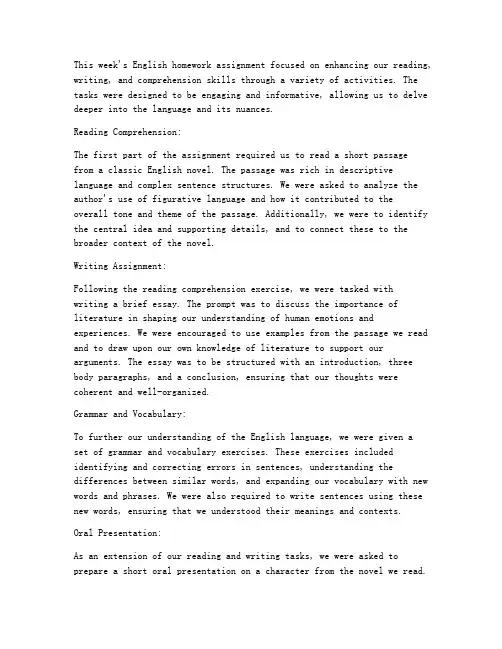
This week's English homework assignment focused on enhancing our reading, writing, and comprehension skills through a variety of activities. The tasks were designed to be engaging and informative, allowing us to delve deeper into the language and its nuances.Reading Comprehension:The first part of the assignment required us to read a short passagefrom a classic English novel. The passage was rich in descriptive language and complex sentence structures. We were asked to analyze the author's use of figurative language and how it contributed to theoverall tone and theme of the passage. Additionally, we were to identify the central idea and supporting details, and to connect these to the broader context of the novel.Writing Assignment:Following the reading comprehension exercise, we were tasked withwriting a brief essay. The prompt was to discuss the importance of literature in shaping our understanding of human emotions and experiences. We were encouraged to use examples from the passage we read and to draw upon our own knowledge of literature to support our arguments. The essay was to be structured with an introduction, three body paragraphs, and a conclusion, ensuring that our thoughts were coherent and well-organized.Grammar and Vocabulary:To further our understanding of the English language, we were given aset of grammar and vocabulary exercises. These exercises included identifying and correcting errors in sentences, understanding the differences between similar words, and expanding our vocabulary with new words and phrases. We were also required to write sentences using these new words, ensuring that we understood their meanings and contexts.Oral Presentation:As an extension of our reading and writing tasks, we were asked to prepare a short oral presentation on a character from the novel we read.We were to discuss the character's role in the story, their development throughout the narrative, and the impact they had on the plot. This assignment aimed to improve our public speaking skills and our ability to articulate our thoughts clearly and concisely.Reflection and Self-Assessment:To conclude the assignment, we were asked to reflect on our learning experience. We were to write a brief paragraph discussing what we found challenging, what we enjoyed, and what we learned from the assignment. This reflection was intended to help us assess our progress and identify areas where we can improve.Conclusion:In summary, this week's English homework assignment was a comprehensive and well-rounded experience that covered a range of skills. From reading and writing to speaking and self-assessment, each task contributed to our overall development as language learners. By engaging with classic literature, exploring grammar and vocabulary, and practicing oral presentations, we have not only deepened our understanding of the English language but also honed our critical thinking and communication skills. As we move forward, we are excited to apply the knowledge and techniques we have gained to our future studies and to further enrich our linguistic abilities.。

第1篇Introduction:The implementation of English teaching practice activities is an essential component of language education, providing students with real-life language experiences and fostering their language proficiency. This article aims to provide a comprehensive overview of various English teaching practice activities, their significance, and their impact on students' language learning.1. Role-Playing ActivitiesRole-playing activities are a popular and effective method of English teaching practice. These activities involve students assuming different roles and engaging in simulated conversations or situations. Thebenefits of role-playing include:- Encouraging students to use English in a real context.- Enhancing students' speaking and listening skills.- Promoting creativity and imagination.- Boosting students' confidence in using English.2. Group ProjectsGroup projects allow students to collaborate and work together to complete a task or project. This approach encourages teamwork, communication, and problem-solving skills. Some examples of group projects in English teaching practice include:- Creating a school newsletter or magazine.- Producing a short video or podcast.- Researching and presenting a topic of interest.3. Debates and Discussion ForumsDebates and discussion forums provide students with an opportunity to express their opinions, listen to others, and engage in critical thinking. These activities can be conducted on a variety of topics, such as current events, social issues, or cultural differences. The benefits of debates and discussion forums include:- Developing students' speaking and listening skills.- Improving their ability to articulate thoughts and ideas.- Enhancing their ability to listen actively and respectfully to others.- Fostering a sense of community and mutual respect.4. English CornerEnglish Corner is a student-led activity that provides a casual and informal environment for students to practice their English. Thisactivity can be organized once a week or as needed. Some features of English Corner include:- A relaxed atmosphere where students feel comfortable speaking in English.- A wide range of topics and activities, such as games, quizzes, or movie nights.- The presence of native speakers or language volunteers to provide additional support.5. Cultural Exchange ProgramsCultural exchange programs offer students the chance to learn about and interact with people from different cultural backgrounds. These programs can be organized in various forms, such as:- Hosting international students for a day or a week.- Participating in international exchange trips.- Attending cultural events or festivals.6. Online Language Learning PlatformsOnline language learning platforms provide students with access to a wealth of resources and activities to practice English. Some popular online platforms include:- Duolingo- Babbel- Rosetta StoneThese platforms offer interactive lessons, games, and quizzes that cater to different learning styles and levels.7. Field Trips and Real-Life ProjectsField trips and real-life projects allow students to apply their English skills in real-world situations. Examples include:- Visiting local businesses and conducting interviews.- Participating in community service projects.- Attending cultural events and documenting their experiences.Conclusion:English teaching practice activities play a vital role in enhancing students' language proficiency and fostering their overall development. By incorporating a variety of activities such as role-playing, group projects, debates, English Corner, cultural exchange programs, online platforms, and field trips, educators can create a dynamic and engaging learning environment. These activities not only improve students' language skills but also promote critical thinking, teamwork, and cultural awareness. As language educators, it is our responsibility to continuously explore and implement effective teaching practices to ensure that our students achieve their full potential in English language learning.第2篇Introduction:English teaching practice activities play a crucial role in enhancing students' language skills and fostering their overall development. These activities are designed to engage students in real-life language use, encourage critical thinking, and promote interactive learning environments. This article provides a comprehensive review of various English teaching practice activities, highlighting their benefits, challenges, and implications for both teachers and learners.1. Role-playing and SimulationRole-playing and simulation activities are effective tools for developing students' speaking and listening skills. By assumingdifferent roles and engaging in realistic scenarios, students can practice using English in practical contexts. For example, teachers can create role-playing exercises based on everyday situations such as shopping, ordering food, or solving problems at work. The benefits of this activity include:- Encouraging active participation and motivation among students.- Enhancing students' fluency and pronunciation.- Fostering critical thinking and problem-solving skills.- Promoting cultural understanding and empathy.Challenges:- Time-consuming to prepare and implement.- Potential for low engagement if students are not interested in the given scenarios.- Difficulty in assessing the effectiveness of the activity.2. Group Discussions and DebatesGroup discussions and debates are excellent methods for developing students' speaking, listening, and critical thinking skills. By encouraging students to express their opinions and argue their points,teachers can help them become more confident speakers. Some benefits of this activity include:- Encouraging active participation and critical thinking.- Providing a platform for students to practice listening and responding.- Fostering collaboration and teamwork skills.- Enhancing students' argumentation and public speaking abilities.Challenges:- Potential for dominating by certain students.- Difficulty in managing a large group of students.- Challenges in assessing the quality of students' contributions.3. Project-Based Learning (PBL)Project-based learning involves students working on real-world projects, which require them to use English in various contexts. This approach helps students integrate their language skills into practical situations and develop problem-solving skills. The benefits of PBL include:- Promoting a deeper understanding of the subject matter.- Encouraging students to work collaboratively and share knowledge.- Enhancing students' research, writing, and presentation skills.- Fostering a sense of responsibility and accountability.Challenges:- Time-consuming and resource-intensive.- Difficulty in monitoring and assessing students' progress.- Potential for uneven distribution of tasks among group members.4. Technology-Enhanced Learning (TEL)Technology-enhanced learning activities leverage various digital tools to support language learning. These tools can include online platforms, mobile apps, and multimedia resources. The benefits of TEL include:- Providing a wide range of interactive and engaging activities.- Facilitating personalized learning experiences.- Enhancing students' access to authentic language materials.- Promoting self-directed learning and autonomy.Challenges:- Potential for technological issues and accessibility problems.- Time-consuming to develop and implement.- The need for continuous professional development for teachers.5. Peer Review and FeedbackPeer review and feedback sessions are valuable for developing students' writing and editing skills. By sharing their work with peers and receiving constructive criticism, students can improve their writing quality. The benefits of this activity include:- Encouraging students to take ownership of their writing.- Fostering critical thinking and analytical skills.- Promoting a supportive learning environment.- Enhancing students' ability to provide and receive feedback.Challenges:- Potential for low-quality feedback or peer pressure.- Difficulty in managing the time and organization of the activity.- Challenges in ensuring that all students participate and benefit.Conclusion:English teaching practice activities are essential for fostering students' language skills and overall development. By incorporating a variety of activities such as role-playing, group discussions, project-based learning, technology-enhanced learning, and peer review, teachers can create engaging and interactive learning environments. However, it is crucial to address the challenges associated with these activities to ensure their effectiveness and success. Continuous professional development and adaptation to students' needs are key factors in the successful implementation of these activities.第3篇一、引言随着我国对外开放的不断深入,英语作为一门国际通用语言,其重要性日益凸显。
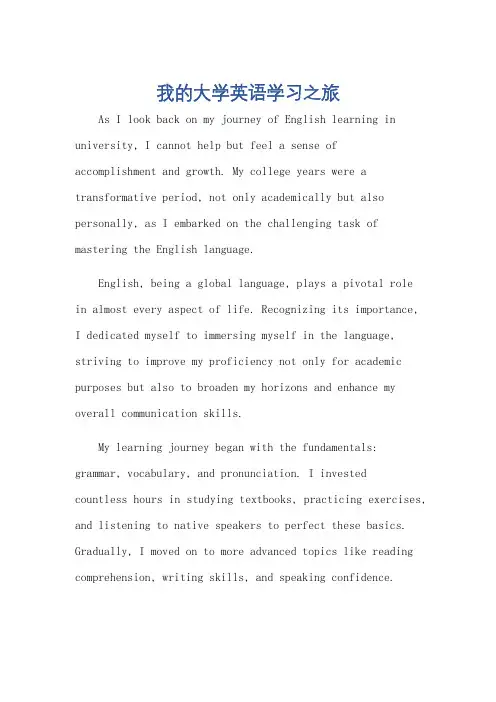
我的大学英语学习之旅As I look back on my journey of English learning in university, I cannot help but feel a sense of accomplishment and growth. My college years were a transformative period, not only academically but also personally, as I embarked on the challenging task of mastering the English language.English, being a global language, plays a pivotal rolein almost every aspect of life. Recognizing its importance, I dedicated myself to immersing myself in the language, striving to improve my proficiency not only for academic purposes but also to broaden my horizons and enhance my overall communication skills.My learning journey began with the fundamentals: grammar, vocabulary, and pronunciation. I investedcountless hours in studying textbooks, practicing exercises, and listening to native speakers to perfect these basics. Gradually, I moved on to more advanced topics like reading comprehension, writing skills, and speaking confidence.One of the most significant aspects of my learning experience was the opportunity to engage in conversational English. I participated actively in speaking clubs and language exchanges, where I could practice my speaking skills in real-time, interacting with native speakers and learning from their feedback. These interactions were invaluable in helping me gain fluency and confidence in my speaking abilities.Another crucial aspect was the exposure to different cultures and perspectives through English literature and films. Studying abroad authors and watching classic films in English not only improved my language skills but also broadened my cultural horizons, allowing me to appreciate the rich diversity of the world.The challenges were aplenty, but the sense of achievement and pride that came with every small milestone made the journey worthwhile. I faced difficulties in grasping complex grammar rules and pronouncing certain sounds correctly. However, with perseverance and regular practice, I was able to overcome these obstacles and make steady progress.Looking back, I am grateful for the opportunities and resources my university provided to facilitate my language learning. The supportive environment, engaging coursework, and diverse cultural experiences contributed significantly to my success in mastering English.In conclusion, my university English learning journey was a transformative and enriching experience that has significantly impacted my life. The skills and confidence I gained through this process have opened up new horizons for me, both academically and professionally. I am excited about the opportunities that lie ahead and look forward to continuing to grow and learn in this dynamic and globalized world.**我的大学英语学习之旅**当我回顾大学英语学习之旅时,我感受到了深深的成就感和成长。
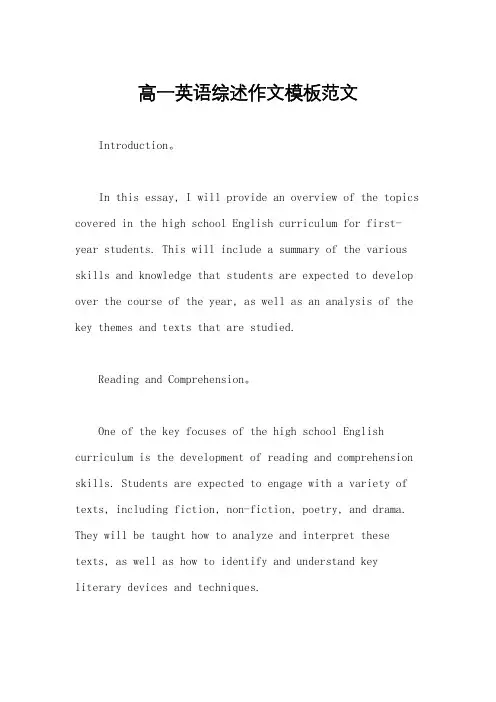
高一英语综述作文模板范文Introduction。
In this essay, I will provide an overview of the topics covered in the high school English curriculum for first-year students. This will include a summary of the various skills and knowledge that students are expected to develop over the course of the year, as well as an analysis of the key themes and texts that are studied.Reading and Comprehension。
One of the key focuses of the high school English curriculum is the development of reading and comprehension skills. Students are expected to engage with a variety of texts, including fiction, non-fiction, poetry, and drama. They will be taught how to analyze and interpret these texts, as well as how to identify and understand keyliterary devices and techniques.Writing。
Another important aspect of the English curriculum is the development of writing skills. Students will be taught how to write in a variety of different styles and formats, including essays, reports, and creative pieces. They will also be expected to develop their ability to structure and organize their writing, as well as to use language effectively to convey their ideas.Grammar and Language。
我的大学英语学习之旅As I embark on my journey through university life, English learning has played a pivotal role in my academic and personal growth. From the moment I stepped onto the campus, I realized that English was not just a subject but a tool that would help me navigate through my academic career.My initial encounters with university-level English were challenging, to say the least. The transition from high school English to the more rigorous and comprehensive university curriculum was not easy. The language barrier was real, and I often found myself struggling with complex grammar structures and vocabulary.However, I quickly realized that the key to overcoming these challenges was regular practice and dedication. I started attending extra tutorials and workshops conducted by the English department, which helped me gain a deeper understanding of the language. I also made it a point to read English books and newspapers regularly, which not only expanded my vocabulary but also gave me a better understanding of Western culture and thought.As I progressed through my university years, I started to appreciate the beauty and power of the English language. The ability to express complex ideas and emotions through words became a source of joy for me. I found myself becoming more confident in speaking and writing in English, and this confidence translated into better academic performance.Looking back, I am grateful for the opportunities and resources my university provided to help me excel in English. The supportive learning environment and the dedication of my teachers and peers have been instrumental in my journey.In conclusion, my university English learning experience has been a transformative one. It has not only equipped me with the language skills necessary for academic success but has also opened up a world of opportunities for personal growth and intellectual exploration. I look forward to continuing this journey and applying the knowledge and skills I have gained in English to future endeavors.**我的大学英语学习之旅**当我踏上大学生活之旅时,英语学习在我的学术和个人成长中起到了至关重要的作用。
小学英语家庭作业文献综述范文English Homework for Primary School Students。
In recent years, English learning has become increasingly important for students in primary school. With the globalization of the world, mastering English has become a necessary skill for young learners. To help students improve their English skills, teachers often assign homework to reinforce what is taught in the classroom. In this article, we will review the types of English homework commonly given to primary school students and discuss their benefits.One common type of English homework is reading assignments. Students are asked to read a passage or a short story in English and answer questions about the text. This type of homework helps improve students' reading comprehension skills and vocabulary. By reading regularly, students can also improve their fluency and pronunciation.Another type of English homework is writing exercises. Students may be asked to write a short essay, a letter, or a diary entry in English. Writing assignments help students practice their grammar and sentence structure. They also encourage students to express their thoughts and ideas in English, which is essential for developing communication skills.Listening exercises are also a popular type of English homework. Students may be assigned to listen to a recording or watch a video in English and answer questions based on what they heard. Listening exercises help students improve their listening skills and comprehension. They also expose students to different accents and speech patterns, which can be beneficial for their overall language development.In addition to reading, writing, and listening exercises, teachers may also assign vocabulary and grammar practice as homework. Students may be asked to memorize new words, practice using them in sentences, or complete grammar exercises. These types of homework help students expand their vocabulary, improve their grammar skills, and reinforce what they have learned in class.Overall, English homework plays a crucial role in helping primary school students improve their English skills. By completing homework assignments, students can reinforce what they have learned in class, practice their language skills, and build confidence in using English. Homework also helps teachers assess students' progress and identify areas where additional support may be needed.In conclusion, English homework for primary school students includes reading assignments, writing exercises, listening exercises, and vocabulary/grammar practice. Each type of homework serves a specific purpose in helping students improve their English skills. By completing these assignments regularly, students can enhance their reading, writing, listening, and speaking abilities in English.。
个人英语学习综述作文500字From a young age, I was fascinated by the melodic soundsof English, a language that opened doors to a world ofdiverse cultures and opportunities. My journey with English began in elementary school, where I was introduced to the alphabet and basic vocabulary. Each letter and word felt like a stepping stone towards a global community.As I progressed through middle school, my English studies became more complex, encompassing grammar, sentence structure, and literature. I found myself immersed in the works of Shakespeare and the adventurous tales of Jules Verne, whichnot only improved my language skills but also broadened my horizons.High school presented a new challenge: conversational fluency. I practiced speaking with native speakers, watched English movies, and participated in language exchange programs. These experiences were invaluable, as they allowed me to understand the nuances of spoken English and feel more confident in expressing myself.The pursuit of academic excellence led me to take advanced English courses in college. Here, I delved intocritical reading, analytical writing, and public speaking.The ability to articulate complex ideas and engage in intellectual debates became a significant part of my academic and personal growth.Throughout my educational career, I've come to appreciate the beauty and versatility of the English language. It has been a constant companion, a tool for learning, and a bridge to connect with people from all walks of life. As I continue to refine my skills, I look forward to the endless possibilities that fluency in English will bring.。
公共英语综述3000字范文Public English is an essential skill in today's globalized world. It is the language of international communication, business, and diplomacy. As such, it is crucial for individuals to have a strong command of the English language in order to succeed in various aspects of life. In this comprehensive overview, we will explore the importance of public English, its impact on personal and professional development, and the various ways in which individuals can improve their English language skills.First and foremost, public English plays a significant role in facilitating communication and understanding among people from different linguistic and cultural backgrounds. In a world where globalization is the norm, being able to communicate effectively in English is a valuable asset. Whether it is for travel, business, or social interactions, having a good command of public English can open doors and create opportunities for individuals to connect with others from around the world.Furthermore, the ability to communicate fluently in English can have a profound impact on an individual's personal and professional development. In today's competitive job market, many employers require candidatesto have strong English language skills. Proficiency inpublic English can give individuals a competitive edge and increase their chances of securing employment opportunities, especially in multinational companies or in roles that require international communication.Moreover, public English is also crucial for academic and educational purposes. Many universities and educational institutions around the world use English as the medium of instruction. Therefore, students who are proficient inpublic English have access to a wider range of educational opportunities, including scholarships, exchange programs, and academic research opportunities.In addition to its practical benefits, learning public English can also have a positive impact on an individual's cognitive abilities. Research has shown that bilingualindividuals often have better problem-solving skills, improved multitasking abilities, and enhanced cognitive flexibility. Therefore, by learning public English, individuals can not only improve their language skills but also enhance their overall cognitive function.There are various ways in which individuals can improve their public English skills. One of the most effective methods is through consistent practice and exposure to the language. This can be achieved through activities such as reading English books, watching English movies and TV shows, and engaging in conversations with native English speakers. Additionally, enrolling in English language courses orhiring a private tutor can also help individuals improve their English language skills.In conclusion, public English is a crucial skill that can have a significant impact on an individual's personal, professional, and academic development. In today'sglobalized world, the ability to communicate effectively in English is a valuable asset that can create numerous opportunities for individuals. By recognizing theimportance of public English and taking proactive steps to improve their language skills, individuals can position themselves for success in an increasingly interconnected world.。
大作文精华总结英语English, as a global language, has become increasingly important in our daily lives. It is essential for communication in various fields such as business, education, science, and technology. In this essay, I will discuss the importance of English and ways to improve English proficiency.Firstly, English is the most widely spoken language in the world. It is the official language of over 50 countries and is spoken by over 1.5 billion people worldwide. In addition, English is the language of international communication. It is used in conferences, meetings, and negotiations between people from different countries. Therefore, having good English skills is crucial for people who work in international organizations or those who travel abroad frequently.Secondly, English is the language of the internet. The majority of the content on the internet is in English. Thisincludes news, social media, and entertainment. Therefore, having good English skills is essential for accessing and understanding the vast amount of information available online.Thirdly, English is the language of education. Many universities and colleges around the world offer courses in English. Therefore, having good English skills is necessary for students who wish to study abroad. Furthermore, English is the language of scientific research. Most scientific papers are written in English, and researchers must be able to read and understand them to stay up-to-date with the latest developments in their field.To improve English proficiency, there are several waysto practice and learn the language. Firstly, readingEnglish books, newspapers, and magazines can help improve vocabulary and grammar. Secondly, watching English movies and TV shows can help improve listening and speaking skills. Thirdly, attending English classes, either in a physical classroom or online, can help improve all aspects ofEnglish proficiency.In conclusion, English is an essential language in our globalized world. It is necessary for communication, accessing information, and education. To improve English proficiency, individuals can read, watch, and attend classes to practice and learn the language.。
英语大作文描述Title: The Importance of Learning a Second Language。
As the world becomes increasingly globalized, the ability to communicate with people from different backgrounds and cultures is becoming more important than ever before. One way to do this is by learning a second language. In this essay, I will discuss the importance of learning a second language and the benefits that come with it.Firstly, learning a second language can help you to communicate with people from different countries. Intoday's world, many businesses operate on a global scale, and being able to speak another language can give you a competitive edge when it comes to finding a job or conducting business. It can also be helpful when traveling to foreign countries, as you will be able to communicate with locals and navigate your way around more easily.Secondly, learning a second language can improve your cognitive abilities. Studies have shown that people who are bilingual have better problem-solving skills, improved memory, and are better at multitasking. This is because learning a second language requires you to use different parts of your brain, which can help to strengthen your cognitive abilities.Thirdly, learning a second language can help you to understand and appreciate different cultures. Language is an important part of a culture, and by learning a new language, you can gain a deeper understanding of the people and their way of life. This can lead to greater empathy and understanding, which can in turn lead to more harmonious relationships between different cultures.Finally, learning a second language can be a fun and rewarding experience. It can be a great way to challenge yourself and learn something new. It can also be a way to meet new people and make new friends, as there are often language exchange programs and other opportunities to practice your language skills with native speakers.In conclusion, learning a second language is becoming increasingly important in today's globalized world. It can help you to communicate with people from different countries, improve your cognitive abilities, broaden your cultural understanding, and be a fun and rewarding experience. So, if you have the opportunity to learn a second language, seize it – it could be one of the best decisions you ever make.。
Al-Cu aluminium alloys The aluminium–copper(2000series)alloys are the primary alloys used in airfrae structural applications where the main design criterion is damage tolerance. The2000series alloys containing magnesium have higher strength resulting from the precipitation of Al2Cu and Al2CuMg phases and superior damage tolerance and good resistance to fatigue crack growth compared to other series of aluminium alloys.The7000series of aluminium alloys show higher strength when compared to other classes ofTitle:Recent developments in advanced aircraft aluminium alloysSource:Materials and Design56(2014)862–871SCI:IF=4.364Authors:Tolga Dursun,Costas SoutisI have to admit that I fail to get the detail information of the two author,though both of them are very famous.They’ve published nearly500articles in material field,several of which bring big significance to this area of research.The review I choose has been cited for199times until now,which will certainly go up because it was published just in2014.Introduce:The cost reduction for aircraft purchase and operation has become a driving force in many airline companies.And weight reduction can improve fuel consumption, increase payload and increase range.Aluminium alloys,which is light,have been the primary structural material for commercial and military aircraft for almost80years due to their well known mechanical behaviour,easiness with design,mature manufacturing processes and inspection techniques,and will remain so for some time to come.This review article covers the latest developments related to aluminium alloys used as aircraft primary structures and highlights performance improvements in the2000, Al–Li alloys,Al–Zn alloys and Al–Cu alloys.The advantages and disadvantages of the joining techniques,laser beam welding and friction stir welding,are also discussed.材料科学与工程学院17S109277白松义Al-Zn aluminium alloys aluminium alloys and are selected in the fabrication of upper wing skins,stringers and horizontal/vertical stabilizers.The compressive strength and the fatigue resistance are the critical parameters in the design of upper wing structural components.The tail of the airplane,also called the empennage,consists of a horizontal stabilizer,a vertical stabilizer or fin,and control surfaces e.g.elevators and rudder.Structural design of both the horizontal and vertical stabilizers is essentially the same as for the wing.Both the upper and lower surfaces of the horizontal stabilizer are often critical in compression loadingdue to bending.Al-Li aluminium alloysReducing the density of materials is accepted as the most effective way of lowering the structural weight of aircraft.Li(density0.54g/cm3)is one of the few elements that have a high solubility in aluminium.This is significant because,for each1% added,the density of an aluminium alloy is reduced by3%.Lithium is also unique amongst the more soluble alloying elements in that it causes a considerable increase in the elastic modulus(6%for each1%Li added).Additional advantage is that, aluminium alloys containing Li respond to age hardening.Joining techniques Joints produced by FSW have higher strengths thanriveted joints and much lower residual stresses thantypical fusion welded joints.In welding7000seriesaluminium alloys,post weld ageing is necessary tostabilise the microstructure in the friction stir weldedregions.The selected overaging treatments alsoimprove corrosion resistance of these alloy. Conclurion:Aluminium alloys have been the primary material for the structural parts of aircraft for more than80years because of their well known performance,well established design methods,manufacturing and reliable inspection techniques.Nearly for a decade composites have started to be used more widely in large commercial jet airliners for the fuselage,wing as well as other structural components in place of aluminium alloys due their high specific properties,reduced weight,fatigue performance and corrosion resistance.Although the increased use of composite materials reduced the role of aluminium up to some extent,high strength aluminium alloys remain important in airframe construction.Aluminium is a relatively low cost, light weight metal that can be heat treated and loaded to relatively high level of stresses,and it is one of the most easily produced of the high performance materials,which results in lower manufacturing and maintenance costs.There have been important recent advances in aluminium aircraft alloys that can effectively compete with modern composite materials.This study covers latest developments in enhanced mechanical properties of aluminium alloys,and high performance joining techniques.The mechanical properties on newly developed2000,7000series aluminium alloys and new generation Al–Li alloys are compared with the traditional aluminium alloys.Future:It is believed that developments of advanced hybrid materials,like fibre metal laminates could provide additional opportunities for aluminium alloys and new material options for the airframe industry.Relevence to my study:Actually speaking,there is no direct relation to my study.Now I’m conducting two project,one of which is on Al diffusion welding.I chose this review just for make it clear in my mind what categories Aluminum alloys are divided into.。